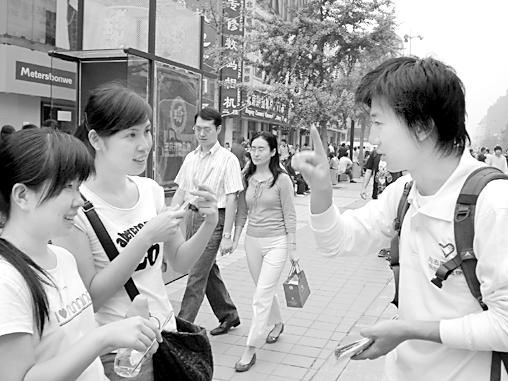In mid-April, 2008, 260 elite volunteers from mainland and non-mainland regions visited Beijing for a four-day intensive training session. "Although the study period was short, it gave us the essence of what we need to know," said Li Yizhou, a volunteer from Chengdu Sports University in southwest China's Sichuan Province. He and his classmates recorded the whole course with digital video recorders and cameras. They will use the recordings as teaching materials to train local volunteers in Chengdu.
In Beijing, the major Olympic host city, volunteers have begun to apply what they have learnt in practice. Tang Junjie, a freshman from prestigious Peking University became one of the first volunteers to enter the Bird's Nest (National Stadium), to help with a "Good Luck Beijing" event. He was responsible for guiding VIP cars inside the underground parking lots. "My job was very tiresome and tedious. I had to be on my feet for seven to eight hours every day," he revealed. "But we kept smiling all the time because we wanted our smiles to leave an impression on the people in the cars. China's image depends on our performance," he said proudly.
According to a BOCOG official, about 33,000 volunteers have helped out with various "Good Luck Beijing" contests - a series of events organized in the build-up to the Games. The volunteers' performance has been praised by athletes, audience, media and local citizens.

A volunteer (R) teaches pedestrains sign language.
Volunteering is not just about helping out at Olympic events. Beijing volunteers also offer information, first aid and translation services in various places around the city. Following Beijing municipal government's guidelines, they have also initiated their own campaigns and services. For example, in fuel stations, they are handing out "smile wristlets", trinkets that promote environment-friendly transportation; they have formed anti-theft forces and patrols to ensure the security and safety of the public; about 100,000 volunteers have donated blood to those in urgent need.
Analyzing this social phenomenon, it is not hard to see that in modern Chinese society, the urge to help others has become a deep-seated need. According to a survey conducted by the People's Daily website, 95 percent of those polled hope, or are willing to become an Olympic volunteer. Jin Xiangmei, a volunteer from Renmin University, said, "I used to think you needed special skills or abilities to be a volunteer. Now I realize that if you want to help others the most important thing is to have a gentle and sincere heart. The feeling of happiness you get from volunteering is profound and lasting."
By their actions Olympic volunteers are creating a precious legacy for Chinese society, and the Chinese authorities have understood the trend. They are determined to preserve the heritage of the Olympic volunteers long after the Beijing Olympic Games by establishing systems and projects to tap people's enthusiasm and allow them to continue volunteering in the post-Olympic era.
(China.org.cn by Pang Li, May 7, 2008)